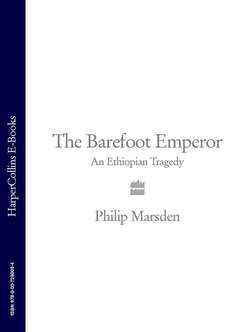Читать книгу The Barefoot Emperor: An Ethiopian Tragedy - Philip Marsden - Страница 28
Оглавление15
For a few years the mission ran smoothly. Tewodros was too busy campaigning to pay the missionaries much attention. But in 1858 he asked them to treat the dying Tewabach, and though they could do nothing, it marked the beginning of a closer relationship. As his own clergy revealed themselves to him as hidebound fools, so Tewodros took to spending time with the south German Pietists, and developed a respect for their brand of unadorned faith. They in turn overlooked his brutal sorties against the Oromo, and came to admire him.
‘He is,’ wrote Kienzlen, ‘the only man in Abyssinia who possesses the fear of God.’
In 1859, a new missionary arrived – Theophilus Waldmeier, a young Swiss of deep humility and an almost saintly gentleness. Tewodros always had favourites among the foreigners, and as the years passed Waldmeier came to fill the gap left by John Bell.
Theophilus Waldmeier had had a strict Catholic upbringing. As a boy he soon realised that ‘the priest is a bigger sinner than other people’. His grandmother beat him with a stick for saying so and he ran away from home. He rejected Catholicism and ended up at missionary school, at the famous St Chrischona College. There Samuel Gobat came and selected him for service in Ethiopia.
He travelled to Ethiopia with another recruit, Saalmuller. With them too was the German missionary Martin Flad and his new wife, Sister Paulina. As a concession to Tewodros’s secular ambitions, they were also accompanied by a man named Schroth and his son. They were gunsmiths. In the last days of 1858 the party set out across the Egyptian desert. A long line of camels stretched behind them – thirty-two, loaded ‘mostly with Amharic Bibles and Testaments’.
The journey itself was a great excitement for young Waldmeier. He was interested in seeing Egypt because it was the land of the pharaohs and the children of Israel had lived there in exile. The desert looked like ‘a past world burned by the wrath of God’, and desert travelling was hard, he warned in his own innocent way, because ‘water is scarce’.
It became harder, and hotter. The sperm-candles in their baggage oozed through the crates and onto the flanks of the camels. Everyone but Mrs Flad fell ill, and they camped for days slumped in the heat, in the shadow of mounds of Bibles. When Schroth and his son died, the others could barely drag themselves out to scrape at the sand to bury them. They all believed that they would soon go the same way. But the Lord spared them, and soon they found themselves climbing into the highlands, surrounded by wild roses and fresh water.
At that time, in 1859, John Bell was liqemekwas, and greeted them in the royal camp. He in turn presented them to Tewodros. Waldmeier thought the emperor very civil. With great charm he asked about their journey, and expressed regret that Schroth and his son had died on the road.
‘It is on account of my sins,’ Tewodros told the missionaries, ‘that God took these two men away from me.’
Tewodros sent them to Meqdela. It was for their own safety. Theophilus Waldmeier settled easily into his new mountaintop home. He shared a hut with five of the other missionaries, studied Amharic and taught some basic mechanical skills. There were long debates about the Bible with the royal scribe Debtera Zeneb, who in time came to see the true light of the Gospel.
Waldmeier was delighted by the country of his calling. After the rains, he wrote, the entire land turned into ‘a beautiful flower garden’. The people were ‘nice-looking’ and ‘clever in everything when taught’. Like Plowden before him, he dreamed of Ethiopia’s development, of its prospects if it could ‘only have good government, and its own old sea-port of Massowah’. He believed too in Tewodros’s good intentions. ‘Where is another king to be found, who in spite of his power and greatness in self-denial disdains all comforts, luxury and good living – he lives very poorly, while he rewards and gives royally – who in living trust in God’s help lays before his feet heathen and wild nations?’
In turn, Waldmeier came to the attention of Tewodros early on by repairing some of his great store of broken muskets.
By December, Waldmeier had even married into his family. Among the community on top of Meqdela was Tewodros’s cousin Wurqnesh, the wife of John Bell. Waldmeier married their eldest daughter, Sarah (Saalmuller later married her sister). For the wedding Tewodros sent Waldmeier an ornamental saddle embroidered with gold thread, a silk shirt of rank, eighty oxen and five hundred sheep. The feast continued for a whole week.
But Waldmeier felt Meqdela was too isolated for their evangelical work. He told his father-in-law, John Bell, that they needed to establish a mission. Tewodros gave them Gefat, a small hill a little to the north of his capital at Debre Tabor. Plowden had lived here for a while. It was a beautiful place. Accounts of the early days at Gefat, with the young families clearing brush to build lodgings and huts, opening a school for children of the poor, shine with a pioneer zeal.
In time Gefat became a great centre of technical skills. The missionaries built a water wheel. Tewodros sent hundreds of people there for instruction – ‘all the clever men of Abyssinia were brought thither by order of the king’. Tewodros himself paid visits more and more frequently. ‘I often sat for hours with the king,’ wrote Waldmeier, ‘engaged in religious conversation and speaking about the welfare of his country and its people.’
Then John Bell was killed and Tewodros’s world grew darker. The high-minded conversations became less frequent and the emperor made it clear what he wanted from the missionaries at Gefat. He wanted them to build guns, bigger and bigger guns.
